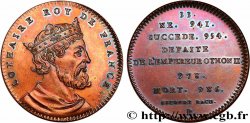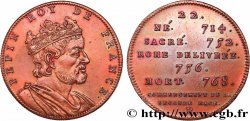fjt_251702 - SÉRIE MÉTALLIQUE DES ROIS DE FRANCE Règne de HUGUES CAPET - 35 - frappe d’origine, légère n.d.
无库存.
所有在网站上销售的产品 (2015)
价格 : 45.00 €
所有在网站上销售的产品 (2015)
价格 : 45.00 €
种类 Règne de HUGUES CAPET - 35 - frappe d’origine, légère
日期: n.d.
材质 red copper
直径 32 mm
模子方针 12 h.
重量 11,06 g.
侧面 cannelée
稀少度 R1
正面
正面的文字 HUGUES CAPET ROY DE FRANCE.
正面的说明书 Buste imaginaire couronné et drapé à droite.
背面
背面的文字 35 - NÉ 941* - COURONNÉ 987 - RETABLISSEMENT DE LA DISCIPLINE ECCLESIASTIQUE - MORT 996 - COMMENCEMENT DE LA TROISIEME RACE / P..
背面的说明书 en huit lignes.
评论
Hugues Capet (né vers 940, mort au lieu-dit « Les Juifs », près de Prasville (Eure-et-Loir) le 24 octobre 996), duc des Francs (960-987), puis roi des Francs (987-996), fut le premier souverain de la dynastie capétienne. Fils de Hugues le Grand et de son épouse Hedwige de Saxe, il est l'héritier des puissants Robertiens, la lignée qui est en compétition pour le pouvoir avec la dynastie carolingienne et les grandes familles aristocratiques de Francie aux IXe et Xe siècles.
La fin du Xe siècle connaît le début d'une révolution économique et sociale qui allait trouver son apogée vers 1100 Les progrès agricoles, le début des défrichements et l'augmentation des capacités d'échanges entraînée par l'introduction du denier d'argent par les premiers Carolingiens, entraînent une dynamique économique encore timide mais réelle. Dans le même temps, la fin des invasions et la continuité des guerres personnelles entraînent la construction des premiers châteaux privés où peuvent trouver refuge les paysans. En parallèle, la nouvelle élite guerrière, les chevaliers, entre en concurrence avec l'ancienne aristocratie foncière carolingienne. Pour canaliser ces nouveaux venus et pour assurer la protection de leurs biens, l'aristocratie et l'Église soutiennent et exploitent le mouvement de la paix de Dieu. C'est dans ce contexte qu'Hugues Capet peut instaurer la dynastie capétienne.
Pour la suite de la biographie, voir http://fr.wikipedia.org/wiki/Hugues_Capet.
Hugh Capet (born around 940, died at the place called \\\"Les Juifs\\\", near Prasville (Eure-et-Loir) on October 24, 996), Duke of the Franks (960-987), then King of the Franks (987-996), was the first sovereign of the Capetian dynasty. Son of Hugh the Great and his wife Hedwig of Saxony, he is the heir to the powerful Robertians, the line that competed for power with the Carolingian dynasty and the great aristocratic families of Francia in the 9th and 10th centuries..
The end of the 10th century saw the beginning of an economic and social revolution which would reach its peak around 1100. Agricultural progress, the beginning of land clearing and the increase in trading capacity brought about by the introduction of the silver denarius by the first Carolingians, led to an economic dynamic which was still timid but real.. At the same time, the end of invasions and the continuation of personal wars led to the construction of the first private castles where peasants could find refuge.. At the same time, the new warrior elite, the knights, entered into competition with the old Carolingian landed aristocracy.. To channel these newcomers and to ensure the protection of their property, the aristocracy and the Church supported and exploited the Peace of God movement.. It is in this context that Hugh Capet can establish the Capetian dynasty.
For the rest of the biography, see http://fr. Wikipedia. org/wiki/Hugues_Capet
La fin du Xe siècle connaît le début d'une révolution économique et sociale qui allait trouver son apogée vers 1100 Les progrès agricoles, le début des défrichements et l'augmentation des capacités d'échanges entraînée par l'introduction du denier d'argent par les premiers Carolingiens, entraînent une dynamique économique encore timide mais réelle. Dans le même temps, la fin des invasions et la continuité des guerres personnelles entraînent la construction des premiers châteaux privés où peuvent trouver refuge les paysans. En parallèle, la nouvelle élite guerrière, les chevaliers, entre en concurrence avec l'ancienne aristocratie foncière carolingienne. Pour canaliser ces nouveaux venus et pour assurer la protection de leurs biens, l'aristocratie et l'Église soutiennent et exploitent le mouvement de la paix de Dieu. C'est dans ce contexte qu'Hugues Capet peut instaurer la dynastie capétienne.
Pour la suite de la biographie, voir http://fr.wikipedia.org/wiki/Hugues_Capet.
Hugh Capet (born around 940, died at the place called \\\"Les Juifs\\\", near Prasville (Eure-et-Loir) on October 24, 996), Duke of the Franks (960-987), then King of the Franks (987-996), was the first sovereign of the Capetian dynasty. Son of Hugh the Great and his wife Hedwig of Saxony, he is the heir to the powerful Robertians, the line that competed for power with the Carolingian dynasty and the great aristocratic families of Francia in the 9th and 10th centuries..
The end of the 10th century saw the beginning of an economic and social revolution which would reach its peak around 1100. Agricultural progress, the beginning of land clearing and the increase in trading capacity brought about by the introduction of the silver denarius by the first Carolingians, led to an economic dynamic which was still timid but real.. At the same time, the end of invasions and the continuation of personal wars led to the construction of the first private castles where peasants could find refuge.. At the same time, the new warrior elite, the knights, entered into competition with the old Carolingian landed aristocracy.. To channel these newcomers and to ensure the protection of their property, the aristocracy and the Church supported and exploited the Peace of God movement.. It is in this context that Hugh Capet can establish the Capetian dynasty.
For the rest of the biography, see http://fr. Wikipedia. org/wiki/Hugues_Capet








 对产品描述纠错
对产品描述纠错 打印
打印 分享我的选择
分享我的选择 提问
提问 Consign / sell
Consign / sell
 产品介绍
产品介绍










